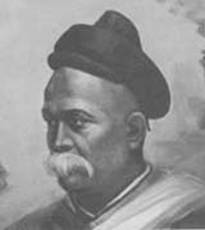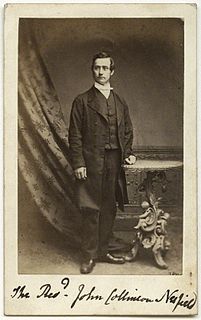
Archibald Stansfeld Belaney, commonly known as Grey Owl, was a British-born conservationist, fur trapper, and writer who disguised himself as a Native American man. While he achieved fame as a conservationist during his life, after his death, the revelation that he was not Indigenous, along with other autobiographical fabrications, negatively affected his reputation.

Burmese Days is the first novel by English writer George Orwell, published in 1934. Set in British Burma during the waning days of empire, when Burma was ruled from Delhi as part of British India, the novel serves as "a portrait of the dark side of the British Raj." At the centre of the novel is John Flory, "the lone and lacking individual trapped within a bigger system that is undermining the better side of human nature." The novel describes "both indigenous corruption and imperial bigotry" in a society where, "after all, natives were natives—interesting, no doubt, but finally...an inferior people".

Colonial India was the part of the Indian subcontinent that was under the jurisdiction of European colonial powers during the Age of Discovery. European power was exerted both by conquest and trade, especially in spices. The search for the wealth and prosperity of India led to the colonisation of the Americas after Christopher Columbus went to the Americas in 1492. Only a few years later, near the end of the 15th century, Portuguese sailor Vasco da Gama became the first European to re-establish direct trade links with India since Roman times by being the first to arrive by circumnavigating Africa. Having arrived in Calicut, which by then was one of the major trading ports of the eastern world, he obtained permission to trade in the city from the Saamoothiri Rajah. The next to arrive were the Dutch, with their main base in Ceylon. Their expansion into India was halted after their defeat in the Battle of Colachel by the Kingdom of Travancore, during the Travancore–Dutch War.

Paul Mark Scott was an English novelist best known for his tetralogy The Raj Quartet. In the last years of his life, his novel Staying On won the Booker Prize (1977). The series of books was dramatised by Granada Television during the 1980s and won Scott the public and critical acclaim that he had not received during his lifetime.

Rao Bahadur Mahadev Govind Ranade, popularly referred to as Justice Ranade, was an Indian scholar, social reformer, judge and author. He was one of the founding members of the Indian National Congress party and owned several designations as member of the Bombay legislative council, member of the finance committee at the centre, and judge of the Bombay High Court, Maharashtra.
The Indian Civil Service (ICS), officially known as the Imperial Civil Service, was the higher civil service of the British Empire in India during British rule in the period between 1858 and 1947.
Indian English literature (IEL), also referred to as Indian Writing in English (IWE), is the body of work by writers in India who write in the English language and whose native or co-native language could be one of the numerous languages of India. Its early history began with the works of Henry Louis Vivian Derozio and Michael Madhusudan Dutt followed by Rabindranath Tagore and Sri Aurobindo. R. K. Narayan, Mulk Raj Anand and Raja Rao contributed to the growth and popularity of Indian English fiction in the 1930s. It is also associated, in some cases, with the works of members of the Indian diaspora who subsequently compose works in English.
Nationality words link to articles with information on the nation's poetry or literature.
A gentlewoman in the original and strict sense is a woman of good family, analogous to the Latin generosus and generosa. The closely related English word "gentry" derives from the Old French genterise, gentelise, with much of the meaning of the French noblesse and the German Adel, but without the strict technical requirements of those traditions, such as quarters of nobility.
Hilda Campbell Vaughan was a Welsh novelist and short story writer writing in English. Her ten varied novels, set mostly in her native Radnorshire, concern rural communities and heroines. Her first was The Battle to the Weak (1925), her last The Candle and the Light (1954). She was married to the writer Charles Langbridge Morgan, who had an influence on her writings. Although favourably received by her contemporaries, Vaughan's works later received minimal attention. Rediscovery began in the 1980s and 1990s, along with a renewed interest in Welsh literature in English as a whole.

The bibliography of George Orwell includes journalism, essays, novels and non-fiction books written by the British writer Eric Blair (1903–1950), either under his own name or, more usually, under his pen name George Orwell. Orwell was a prolific writer on topics related to contemporary English society and literary criticism, who has been declared "perhaps the 20th century's best chronicler of English culture." His non-fiction cultural and political criticism constitutes the majority of his work, but Orwell also wrote in several genres of fictional literature.
Lovat Dickson, born Horatio Henry Lovat Dickson, was a notable publisher and writer, the first Canadian to have a major publishing role in Britain. He is best known today for his biographies of Grey Owl, Richard Hillary, Radclyffe Hall and H. G. Wells. He also wrote a history of the Royal Ontario Museum.
Dorothy MacLeish, née Black was a British journalist and writer of over 100 romance novels and several short stories from 1916 to 1974 under her maiden name Dorothy Black and as Peter Delius. In 1934 published anonymously Letters of an Indian Judge to an English Gentlewoman, later reedited under her name. She wrote her auto-biography "The Foot of the Rainbow" in 1960.
Gerald Hanley was an Irish novelist and travel writer and was born in Liverpool of Irish parents. Hanley's novels reflect his experiences of living in Africa, Burma and the Indian sub-continent, as well as his life as a soldier. His first book, Monsoon Victory was published in 1946, and his last novel, Noble Descents in 1982.
The Indian Imperial Police, referred to variously as the Imperial Police or simply the Indian Police or, by 1905, Imperial Police, was part of the Indian Police Services, the uniform system of police administration in British Raj, as established by Government of India Act 1858, Police Act of 1861. It was motivated by the danger experienced by the British during the 1857 rebellion.
Dennis Kincaid was a civil servant in British India, a novelist and the writer of chhatrapati Shivaji Maharaj: The Grand Rebel, a widely respected account of the life of the sixteenth century self-made Emperor, and British social life in India, 1608-1937, a classic account of the British in colonial India.

U Dhammaloka was an Irish-born migrant worker turned Buddhist monk, strong critic of Christian missionaries, and temperance campaigner who took an active role in the Asian Buddhist revival around the turn of the twentieth century.
Roger Bradshaigh Lloyd was an influential Anglican priest and wide-ranging writer in the immediate context of the Second World War and the mid-twentieth century.
Joseph Snell Wood, usually known as J. S. Wood, was a business man and journalist in London. For the last thirty years of his life he was the editor and publisher of The Gentlewoman, a prominent illustrated paper for women which he had founded in 1890, and he was also chairman of Press Printers Limited.

John Collinson Nesfield served in various roles as an educator in British India and was for some time curate of St Michael's Church, Highgate, London. He wrote numerous books, of which his works on grammar were particularly influential.







